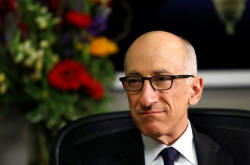|
Commodity Futures Trading Commission Chairman Timothy Massad had
said he expected to leave once President-elect Donald Trump took
office and he hoped for a smooth transition in handing the
regulatory reigns over to the sole Republican commissioner, J.
Christopher Giancarlo.
Massad plans to stay on as a commissioner for a few weeks after
stepping down to close out administrative matters, according to
the CFTC.
Since he took the chair two and a half years ago, Massad has
raced to set up regulations for carrying out the many new
responsibilities the CFTC was given by the 2010 Dodd-Frank Wall
Street reform law.
Massad said in a statement that the commission had made
"significant progress" in creating regulations for swaps and in
"the areas posing the greatest risk to the financial system."
Giancarlo has already signaled that he will move the CFTC's
agenda beyond implementing Dodd-Frank and has repeatedly
criticized the commission's work with its international
counterparts. By implementing new rules on derivatives trading
first, the United States has given markets in other countries an
advantage and created "regulatory arbitrage," he has said.
Massad countered Giancarlo's position in his good-bye statement
on Tuesday.
"We have improved international coordination by harmonizing
rules in many areas, strengthening relationships, and working
with other regulators on oversight of markets, all of which has
reduced inconsistency and the risk of regulatory arbitrage," he
said.
"And we have taken action to address the new challenges and
opportunities in the derivatives markets, particularly cyber
threats, clearinghouse resilience, and the increased use of
automated trading," he also said.
(Additional reporting by Eric Walsh; Editing by Eric Beech and
Sandra Maler)
[© 2017 Thomson Reuters. All rights
reserved.] Copyright 2017 Reuters. All rights reserved. This material may not be published,
broadcast, rewritten or redistributed.
 |
|




